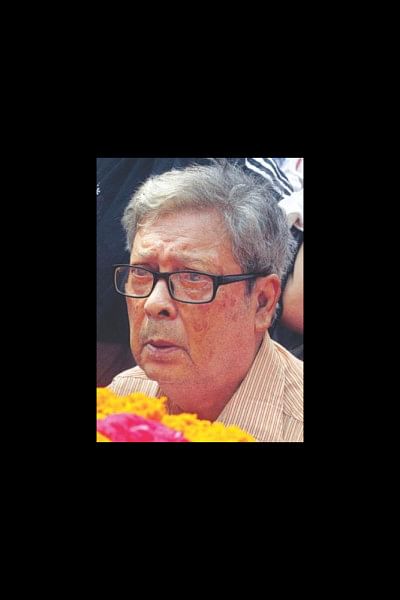Professor Ajoy Roy - A profile in patriotism, human rights, and science

Ajoy Roy has worn many hats throughout his life—as a bright scientist; professor of physics; human rights and secular activist; author; and perhaps, most significant of all, as a valiant freedom fighter. It is indeed hard to come up with an example of a Bangladeshi as decorated as Prof Roy. To sum up, the life of Prof Roy epitomises the famous Kennedy dictum, "Ask not what your country can do for you, ask what you can do for your country."
I have been lucky enough to interact and work with this courageous man for a brief period during the 2000s while serving as a co-moderator at Mukto-Mona, the online forum for Bengali secularists and freethinkers, founded by slain secular activist, blogger and Prof Roy's son, Avijit Roy. Prof Roy had been on the advisory board of Mukto-Mona. I have seen his passion and tireless energy to help and support the voiceless, poor and powerless.
Mukto-Mona activists dared to stand by human rights, freedom of expression and critical thinking. At times I paused, slowed down but not Avijit. A software engineer by training, Avijit's unofficial, 24/7 job was to not let go of anything unchallenged when it came to fighting religious bigotry and fanaticism.
Beyond writing, promoting reason and science, Mukto-Mona occasionally undertook projects to help the poor and needy in remote areas, using funds made of small donations from our members. One such project was to rebuild a primary school obliterated by the devastating flood of 2004 in Roumari, a remote village in Kurigram in northern Bangladesh. Often, from Dhaka, Prof Roy and his team (activists of Shiksha Andolan Manch) would travel several hundred miles by bus, boat to the project site to monitor the progress and would report back to us with meticulous details and pictures. I always marvelled at the man who was in his late 60s yet full of stamina and the spirit of a young man.
As if the call from his motherland to serve was far from over, Prof Ajoy Roy rose to the occasions whenever human rights, people's freedom of expression were attacked. He protested, spoke and wrote about the plight of minorities and freethinkers in Bangladesh and beyond, including the vicious attacks on writers such as Humayun Azad.
In 2015 Avijit Roy was murdered in daylight by extremists at Ekushey book fair in Dhaka. His wife, Bonya Ahmed, was seriously wounded. Avijit was only 42 but has inspired—via his writing of many thought-provoking articles and books (even more so after his death)—hundreds of freethinkers in Bangladesh and around the world.
Yet for his family, Avijit's premature death had left a void that won't fill. Never. I can only imagine and would never quite feel the pain, shock, and disappointment Prof Ajoy Roy had to endure after the murder of his son. What could be more tragic for a freedom fighter than to live with the reality that his young, brilliant son was hacked to death only because he expressed his opinions freely?
I do not know what the fighting in the field felt like in 1971 for Ajoy Roy but I am sure in his wildest dreams he did not envision this tragic reality in the country that he fought for.
In 2012, the Bangladesh government bestowed upon Ajoy Roy the country's highest civilian honour, the Ekushey Padak. Though ceremonial, it was long due and a praiseworthy step. However, the administration has failed a father who, at 84 with ailing health and in a wheelchair, had been, for four years, attending the court hearing of his son's murder case without a visible headway. Tragically he had to leave this world on December 9 without getting any justice.
Jahed Ahmed lives and works in New York. Email: [email protected]

 For all latest news, follow The Daily Star's Google News channel.
For all latest news, follow The Daily Star's Google News channel. 



Comments